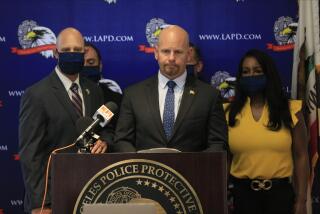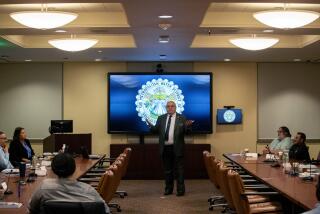More government pay data released in the wake of the Bell scandal
At least 15 local government agencies across California paid top executives more than $300,000 in 2009, the state controller’s office reported Tuesday as officials widened an inquiry into high government salaries that they launched in the wake of the Bell scandal.
Controller John Chiang demanded salary information from nearly 900 local government entities — but more than 172 either refused to provide information or provided inadequate data. Some now face possible fines up to $5,000. The compensation figures, posted Tuesday to a database on the controller’s website, cover employees from 693 transit, waste disposal, and fire and police protection districts.
The report is part of Chiang’s ambitious effort to document the compensation of all government officials and employees in the state, started after the salary scandal in Bell. In October, his office posted compensation figures for all cities and counties. In the coming months, Chiang plans to collect and post salary information from about 3,400 California special districts, including many obscure agencies that rarely receive public attention or scrutiny.
Of the thousands of positions reported Tuesday, the highest-paid employee was the general manager of the East Bay Municipal Utility District, which provides water for several Bay Area cities, including Oakland and Berkeley. That position is held by Dennis Diemer, who made $420,220 in 2009.
Diemer, who is retiring this month, said in an interview that his pay surged in 2009 because he cashed in $107,000 in unused vacation time accumulated over his 30-year career. In 2010 his pay dropped to $315,000, he said.
“It was a one-time spike,” Diemer said, adding that he supported Chiang’s report but hoped it would be refined.
Several Los Angeles-area officials ranked among the highest-paid employees listed Tuesday, including Expo Line Construction Authority Chief Executive Richard Thorpe and former Metrolink Chief Executive David Solow, who in 2009 made $371,917 and $340,381 respectively.
The data released Tuesday include more than 40,000 employees of special districts, and the October posting covered more than 600,000 city and county workers . Many employees were paid $100,000 or less.
By contrast, a number of transportation executives and managers of major utilities were high earners. Several police and fire chiefs also earned more than $250,000 in 2009. For example, a police commander in the Bay Area Rapid Transit District made more than $355,000 in total wages that year.
The executive director of the Cucamonga County Water District earned $344,466, the general manager of the Santa Margarita Water District earned $376,297 and the assistant general manager of the Coachella Valley Water District earned $350,503.
Chiang said financial transparency in public entities was “critical to the health of our democracy” and that there needed to be a central clearinghouse for the public to learn how much their government leaders are making.
“I thought this type of reporting was necessary four years ago, pre-dating Bell,” he said. “You can’t have failing cities and counties and special districts. It will take down your infrastructure.”
He said he hoped the database would help the public “get a better sense of compensation and decide if it’s fair.”
To capture the total compensation paid to employees, the controller’s office specifically requested “Box-5 Wages,” or wages subject to Medicare, from the employees’ W-2 forms. These include base salary, overtime pay, and cash payouts for unused vacation and sick leave.
In separate columns, the database indicates employees’ base salaries, retirement benefit formulas, and contributions made by employers toward retirement plans, deferred compensation and health benefits.
Because of the large number of special districts in the state, data from them were split into four separate phases. Chiang’s office plans to post the final three phases and data from state employees by June.
“I don’t see anything but good happening from this,” said Michael Coleman, a local government finance expert based in Sacramento. “It gives the public the opportunity to ask the appropriate questions, and these agencies need to have the appropriate answers.”
Of the 30 districts in Los Angeles County from which Chiang requested data for the first phase of his survey, 29 responded with compliant data.
Chiang said his office had the authority to fine districts that did not comply with his survey but said he would first wait to make sure those districts had enough personnel and proper instructions for the task.
RELATED:
Full coverage of the City of Bell salary scandal
More to Read
Sign up for Essential California
The most important California stories and recommendations in your inbox every morning.
You may occasionally receive promotional content from the Los Angeles Times.










